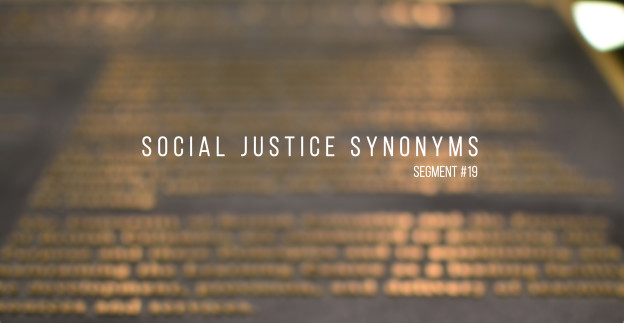In honour of Rule Out Racism Week here at UBC, this week’s Social Justice Synonym is dedicated to the term “slave.” The casual use of the word “slave” to express conditions that are considered unfair (“Working this hard, and this long on a project is basically slavery”) or even to convey how hard a person has worked, (“I basically slaved over that paper”) not only trivialises an institution that is in many ways unthinkable, but also actively contributes to the on-going denial of slavery’s impact on the present day.
Of the many times I have heard this particular casual and glib use of the term, one particular day sticks out to me. I’d just walked out of a history class (the irony doesn’t escape me, here) when I heard two students talking about a paper that our professor had just assigned to us. In a moment of frustration, one student turned to the other and said: “I hate this so much, we have so much work to do this weekend. Our professor is treating us like slaves. We’re basically slaves.”
Although I certainly empathised with the frustration of having to push back my weekend plans, I was struck with an unsteady feeling at the students’ language. At the time, I didn’t feel like I had the words to articulate the uneasiness of my surprise at how comfortably and smoothly those words slid out their mouths. What I knew, was that our professor was not a slave master, and that what we were experiencing was certainly not slavery – far from it.
Jamaica Kincaid, an Antiguan-American writer who has, in many ways, grappled with the impact of colonialism and the many legacies of the Trans-Atlantic Slave Trade has written that, “the space between the idea of something and its reality, is always wide and deep and dark.”
Similarly, from I what I overheard that day after history class, the space between the casual idea of slavery and it’s reality is unimaginably wide, and seemingly unthinkable in its depth and darkness.
At the heart of this space, I think, is an unwillingness to grapple with issues that the Trans-Atlantic Slave Trade raises. And rather than confront the often ugly truths that slavery reveals, it is easier to trivialise them – both in everyday acts such as the conversation I overheard, and on systemic levels where slavery’s lasting legacy is continually denied all over the world both by individual politicians and entire governments.
The trans-Atlantic slave trade was the largest, long-distance forced migration of any groups people in history. Though details and statistics vary, within the span of four hundred years, more than ten million Africans were taken from the continent and transported to the West as chattel. Like a meticulously conducted Big Bang, slavery scattered millions people all over the Earth, disrupting and displacing countless families and kinship networks.
As writers, archivists and historians such as W.E.B. Du Bois, Nell Irvin Painter, Winthrop Jordan, Cornel West, Angela Davis, Ta-Nehisi Coates and many, many more have shown us, the trans-Atlantic slave trade is responsible for the concept of race as we know it today. Through the unpaid labour of generations of peoples of African descent, slavery helped to build empires.
Yet its legacy is both denied, and deniable.
When #blacklivesmatter activists point to more than two-hundred and fifty years of slavery, followed by more than ninety years of racist Jim Crow laws, followed by more than sixty years of racial segregation and more of slavery’s complex legacy to explain the current fatal assault on black lives in the United States, they are widely dismissed.
Similarly in Canada, when numerous journalists, poets, theorists, activists and more reveal Canada’s own history, where slavery was legal in New France and in Lower Canada under British rule for more than two centuries, and where people of African descent were bought and sold at almost every level of society, these truths are also often dismissed, or trivialised. This happens despite the fact that slavery helped facilitate Canada’s own settler colonial project, where Indigenous people were, and continue to be, violently displaced off their lands.
What I mean to do here is only hint at the breadth and scope of slavery as an institution that still has many complex consequences. The wounds inflicted still bleed into the present day. My aim with this piece is not to make slavery thinkable – much ink has been spilled in that effort by many a better pen than mine. But I hope that there’s enough here to at least give you pause the next time you overhear someone using the term glibly, or in the moments before you use the term yourself.
When you think using the word or a phrase casually including the word “slave,” please consider using these alternatives:
| Word/Phrase | Alternative |
| “I slaved over that paper” | “I worked really hard on that paper” |
| “That professor’s treating us like slaves” | “I really feel as if that professor’s giving us an unfair amount of work” |
| “I’m a slave for you” | …um. “I really like/love you, and am feeling a hot mess of feelings of devotion towards you” |
| “I feel like a slave” | “I’m feeling tired/frustrated/overworked/unrecognised” |




